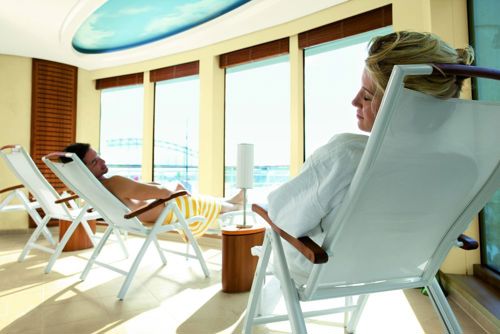
5 things couples argue about on holiday – and how to avoid them
Travelling on your own can be a chapter-opening adventure. Travelling with friends can be a riot. Travelling with your significant other? Well, that’s a special kind of experience.
It’s a time to witness a new side of one another, set the tone for your relationship and create memories you can look back on for years to come. Of course, it’s an opportunity to spend quality time together without all the usual distractions.
Travelling with friends is an adventure of its own, but with a partner, it's an opportunity to deepen your relationship. "Travelling together allows for two people to have time together without the hustle and bustle of life," leadership coach Dr. Benjamin Ritter of Live for Yourself Consulting told Newmarket Holidays.
He also notes that venturing out together can "re-ignite or strengthen the spark in a relationship."
"Travel is also a great way to draw closer to your partner and to rekindle the fires of attraction. Heading out on an adventure provides us with novel experiences that help us discover a little bit more about who we are and how we respond to unfamiliar territory," relationship counsellor and author Dr. Suzanne Degges-White told Newmarket Holidays.
As such, couples do tend to expect a lot out of their holidays - and so they should! However, this can lead to unhealthy pressure for it to be a perfect, conflict-free experience. According to a study, 40% of partners argue during their holiday.
"Because holidays should be relaxing, pleasant, and rejuvenating, minor stresses might turn into major arguments just because you’re away from the familiar and you’ve pinned so much hope on the holiday being an escape from real life," Dr. Degges-White said. Fortunately, this doesn't need to be the norm. Whether you’re gearing up for your first trip without the kids or your first holiday ever, here are some sore spots to be mindful of.
The small things
As Dr. Degges-White mentioned, minor stresses can escalate while you're on your dream holiday. While travel can bring out the best in us - making us more daring, open-minded and above all, sun-tanned - it can occasionally bring out the worst in us.
"If you're going on vacation with your significant other and you are going to be with each other every second of every day for a prolonged period of time, you can almost expect to fight about being on time, random hiccups, simple things like where to eat," said Dr. Ritter said.
"Fighting while travelling together is less about the topics that you are arguing about and more about the reasons behind the arguments. Such as you probably wouldn't argue about where to eat when you were home but because you want to please each other and don't want to disappoint each other it becomes a topic where neither of you can make a decision, patience wears thin, and you end of having a huge blowout argument about where to just get a simple meal."
While you might not be able to plan for times when you might get impatient or indecisive, there is one logistical aspect you can take care of before your trip: the budget.
Determining what you both expect to spend (or splurge) on in terms of activities, meals, accommodation, tours and experiences will ensure you get the intricate details sorted, freeing up space for you to luxuriate in the travel experience.
"Couples should have a clear and agreed-upon budget before packing their bags. This avoids on-location disagreements about money and that’s a topic that can be the lightning rod for other disagreements to arise," said Dr. Degges-White. "Once a couple argues about how much to spend on a meal or activity, it invites long-held resentment about prior spending habits to emerge."

Not enough 'me' time
Are you getting enough time to yourself?
Quality time together is precious. However, let’s bear in mind that there can be too much of a good thing. In day-to-day life, you might have more opportunities to take peaceful, centring time for yourself. When on holiday, this isn't always the case.
"Make sure to take time not just for the relationship when you are travelling but for yourself. When you're home you usually have some time to do something that makes you feel good. Travelling can take that away and it's important you also prioritise yourself. It will benefit the relationship."
So, what does the travel-version of prioritising yourself look like? You could get up early and go for a walk. Slip out for a mid-afternoon coffee. Check out the gallery your partner wasn’t interested in yesterday. While both your interests might not perfectly align, freeing up time to visit spots on your individual wish-lists will mean you’ll walk away from the trip without feeling like you missed out.
Or, if you're ready for an even bigger adventure, it could be worth looking into a much-needed solo tour or holiday. Of course, there’s such a thing as too much time alone. "Be smart, pay more attention to your partner than your phone," Dr. Ritter said.
Dr. Degges-White agrees. "Spending too much time on a phone can be a real holiday-downer. Holidays should be time for a couple to adventure together, not to spend time on a working vacation unless both have agreed to this."
So, unless you are using the phone to navigate you through unfamiliar streets, or to snap a photo of your loved one, it’s best to keep it tucked into your rucksack.

Clashing travelling styles
While minor disagreements about destinations, activities, and budgets top the list of the most common holiday arguments, it can also be a challenge to travel with your loved one when you have different travel personalities.
Opposites attract, sure, but it’s wise to have a conversation about what you each expect to get out of the trip before you set off.
"Perhaps the most basic disagreement for some couples is deciding where to go. However, once they’re settled on a destination, another personality clash might occur – the planner versus the laissez-faire traveller," said Dr. Degges-White.
"Sometimes, because opposites attract, one partner is the ultimate planner and the other partner just wants to let a holiday unfold without any specific, hardcore planning in place. The partner who needs to have every moment planned and hotel room booked may be driving their 'let’s see where the road takes us' kind of partner crazy."
If you are nodding your head in agreement, fret not. You and your beloved opposite aren’t doomed. In fact, you might just be able to get a second holiday out of the situation.
"Some couples might decide that they are going to schedule two vacations instead of just one big one. That way, one week can be the dream vacation for the doer and then the second vacation can be a perfect vacation for the let life happen and don’t force things person," said Dr. Degges-White.
Perhaps you prefer to see the sights and delve into the history of a destination rather than kick back and relax. If you find that you’re having different expectations of the holiday, it could be wise (and fun) to consider scheduling a laidback, island-hopping trip – perhaps cruising in Croatia- and then plan a sightseeing tour for another time. An adventure in history-rich Greece might be your best bet for that one.
If multiple holidays aren’t on the cards for you, Dr. Degges-White recommends that you can’t go past a travel wish-list. In a practical sense, it will help you plan for your holiday and avoid conflict.
"Couples might decide to make a list of must-see/do activities and check everything off the list at the start of the vacation. That way, the rest of the time can be allowed to just unfold and the sightseer won’t return home feeling cheated," said Dr. Degges-White.
"Make sure both partners get to have a say in the must-do activities and make sure each person’s top priority, if affordable, is checked off the to-do list before the vacation ends. Regrets about what wasn’t done/seen/enjoyed are always the keenest – make sure you see the pyramids or the sunset or the crown jewels if those are on the list – no matter how long the lines or hot the sun or rainy weather."

Digging up past issues
Communication is fundamental to any relationship, however, it’s a wise idea to leave difficult conversations until after the trip. Particularly if you have recently encountered conflict, or you have past issues that are still lingering.
"Agree to leave out any touchy conversations, have lingering resentment attached to them, and will cause an argument. You know what those are," Dr. Ritter said.
Being out of holiday mode
It’s not in everyone’s nature to relax. While you might be ready to fling on the sunglasses and whip out the camera the minute you touch down, your partner might need to ease into it.
"Agree before travelling that you will expect things to go wrong during the trip, there will be planning hiccups and to make a commitment to finding them funny and not as either partner’s fault," said Dr. Ritter.
If you or your partner find that your stress threshold is lower when outside your normal environment, remember that this is the trip you’ve been planning for. You owe it to yourself - and to each other - to make every effort to remain positive and make the most of your time away.
"Being away from home turf can be stressful for even the person who’s a model of equanimity everywhere else. Irritation can build quickly when you’re hungry, stressed, exhausted, or overwhelmed.
"Work hard to let things roll off your back and not rise to the bait," said Dr. Degges-White.
If you are hoping for a hassle-free escape with your partner, check out some of our favourite trips.






